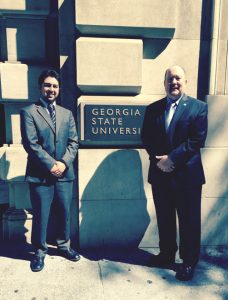The future of B2B marketing theory: A historical and prospective analysis
Interview with authors: Roberto Mora Cortez and Wesley J. Johnston

Roberto Mora & Wesley J. Johnston
We inaugurate this blog with an interview with Roberto Mora Cortez and Wesley J. Johnston that have recently published an interesting article in the Journal Industrial Marketing Management. (Mora Cortez, R. & Johnston, W. J. (2017) . The future of B2B marketing theory: A historical and prospective analysis. Industrial Marketing Management, 66, 90-102.)
What led you to design and conduct this study about the future of B2B marketing theory?
The main motivation was to contribute to the efforts of bringing practitioners and academicians together. Moreover, the field of B2B marketing has been disregarded from top-tier journals in its representativeness, while in reality B2B and B2C worlds are very balanced in economic relevance. Therefore, reviewing the history and theory of B2B marketing with the experienced opinions of experts in the field help researchers to see more relevant paths for their research projects from a practitioner perspective. This as consequence, will provide higher likelihood to collaborate with companies in the research process.
Which were the main objectives of this research?
The main objective was to identify the key research streams that will be relevant for B2B companies, in the context of marketing, for the next three to five years. As mentioned before, as an endeavor to incentivize practitioner-academicians collaboration.
Can you explain the methodology used for this study?
The method was composed by a thorough literature review of B2B marketing field, highlighting historical advancements in structure and theory, in combination with a Delphi panel of experts from the editorial and review board of the three most relevant B2B marketing journals (Journal of Business and Industrial Marketing, Journal of Business-to Business Marketing, and Industrial Marketing Management).
Which were the main findings?
The main finding are the research categories that will help to increase relevance to the research paths of B2B marketing academicians. We found six knowledge clusters that should be follow: (1) Innovation, (2) Customer journey and relationship value, (3) Harnessing technology, (4) Marketing/finance interface and revenue growth, (5) Data analytics, and (6) Industry context/econsystem. All these categories converge in 20 specific research topics that should be seen as direction for future research. In addition, we delivered specific research questions for each main category in order to support the process of theory development.
What are the main contributions to theory and practice?
The main theoretical contributions are the understanding of the evolution of B2B marketing since 1899 and the future research streams (6) that are relevant for practitioners to follow. Due to the richness of the research agenda, we can conclude that B2B marketing theory has huge potential and it is converging to specific issues that academicians should take advantage to increase their efficiency and effectiveness during the research process. The main managerial implications relate to the interest of B2B marketer and how this knowledge can be seen as the key elements of the marketing strategy of successful companies in the next three to five years. Moreover, this research opens a time-window to foster collaboration between academy and real business, and therefore practitioners can team up with researchers to develop a win-win integration with measurable impact on business (bottom line) and theory construction, respectively.
Finally we would like to thank the 41 professors from around the world who participated in the Delphi process to help generate and analyze the data. They are all listed in the paper. Without their help the study would not have been possible. We also thank the Center for Business and Industrial Marketing for its financial support of the study.